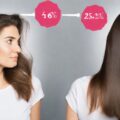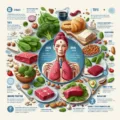The Connection Between Diet and Hair Health
Our hair is often seen as a reflection of our overall health and wellbeing. While genetics play a significant role in hair growth and quality, nutrition also has a profound impact. The foods we eat provide the building blocks for healthy hair growth and maintenance. By understanding the link between diet and hair health, we can make informed choices to nourish our bodies and support luscious locks from the inside out.
A balanced, nutrient-rich diet is essential for optimal hair growth and preventing hair loss. The hair follicles require a steady supply of vitamins, minerals, proteins, and healthy fats to produce strong, vibrant hair. When our diet lacks these key nutrients, it can lead to thinning hair, brittleness, and even hair loss over time.
Key Nutrients for Healthy Hair Growth
Several nutrients play a vital role in promoting hair health and growth:
- Protein: Hair is primarily made of protein, so adequate intake is crucial. Include lean meats, fish, eggs, legumes, and dairy in your diet.
- Iron: Iron deficiency is a common cause of hair loss. Incorporate iron-rich foods like spinach, lentils, and red meat.
- Biotin: This B-vitamin supports keratin production. Find it in eggs, nuts, and whole grains.
- Vitamin C: Helps in the absorption of iron and the production of collagen. Citrus fruits, berries, and bell peppers are excellent sources.
- Omega-3 fatty acids: Support scalp health and may promote hair growth. Include fatty fish, flaxseeds, and walnuts in your meals.
Foods That May Contribute to Hair Loss
While many foods support hair health, some may contribute to hair loss when consumed in excess:
- High-mercury fish: Excessive mercury intake can lead to hair loss. Limit consumption of large predatory fish like tuna and swordfish.
- Sugar and refined carbs: These can increase inflammation and potentially impact hair growth. Opt for whole grains and natural sweeteners instead.
- Excessive vitamin A: While vitamin A is essential, too much can trigger hair loss. Be cautious with supplements and limit intake of liver, which is very high in vitamin A.
Remember, moderation is key. A balanced diet that includes a variety of whole foods is the best approach for overall health, including hair health.
The Role of Hydration in Hair Health
Proper hydration is often overlooked in discussions about hair health, but it plays a crucial role. Water helps to transport nutrients throughout the body, including to the hair follicles. Dehydration can lead to dry, brittle hair and may even contribute to hair loss.
Aim to drink plenty of water throughout the day. Herbal teas and water-rich foods like cucumbers and watermelon can also contribute to your daily fluid intake. By staying well-hydrated, you’re supporting not just your hair health, but your overall wellbeing.
Lifestyle Factors That Complement a Healthy Diet
While diet plays a significant role in hair health, other lifestyle factors can complement your nutritional efforts:
- Stress management: Chronic stress can contribute to hair loss. Practice relaxation techniques like meditation or yoga.
- Regular exercise: Physical activity improves circulation, which can benefit hair growth.
- Gentle hair care: Avoid harsh treatments and use natural, nourishing hair products.
- Adequate sleep: Quality sleep is essential for overall health, including hair growth.
By combining a nutrient-rich diet with these healthy lifestyle habits, you’re creating an environment where your hair can thrive.
When to Seek Professional Help
While diet and lifestyle changes can significantly impact hair health, sometimes hair loss or thinning may be due to underlying health conditions or genetic factors. If you’re experiencing persistent hair loss despite making positive dietary changes, it’s important to consult with a healthcare professional or a trichologist (hair and scalp specialist).
They can help identify any underlying causes and recommend appropriate treatments, which may include specialized diets, supplements, or medical interventions. Remember, seeking help early can often lead to better outcomes and provide peace of mind.
Frequently Asked Questions
1. Can changing my diet reverse hair loss?
While diet alone may not reverse all types of hair loss, improving your nutrition can certainly support hair health and may help slow or prevent further loss in some cases. A balanced diet rich in proteins, vitamins, and minerals provides the nutrients necessary for healthy hair growth.
2. How long does it take to see results from dietary changes?
It typically takes 3-6 months to see noticeable changes in hair growth and quality after making significant dietary improvements. Hair grows in cycles, so patience is key when implementing nutritional changes for hair health.
3. Are supplements necessary for healthy hair growth?
While a balanced diet should provide most of the nutrients needed for healthy hair, certain supplements may be beneficial if you have deficiencies. Always consult with a healthcare professional before starting any supplement regimen.
4. Can vegetarian or vegan diets support healthy hair growth?
Yes, well-planned vegetarian and vegan diets can absolutely support healthy hair growth. Focus on plant-based proteins, iron-rich foods, and consider B12 supplementation to ensure you’re meeting all your nutritional needs.
5. Is it normal to lose some hair every day?
Yes, it’s normal to lose 50-100 hairs per day as part of the natural hair growth cycle. If you’re noticing significantly more hair loss than this, or if you have concerns about thinning hair, it’s best to consult with a healthcare professional.
Remember, nurturing your hair health is a journey of self-care and compassion. By making mindful choices about what you eat and how you care for yourself, you’re not just supporting your hair, but your overall wellbeing. Embrace the process, be patient with yourself, and celebrate the small victories along the way to healthier, more vibrant hair.









